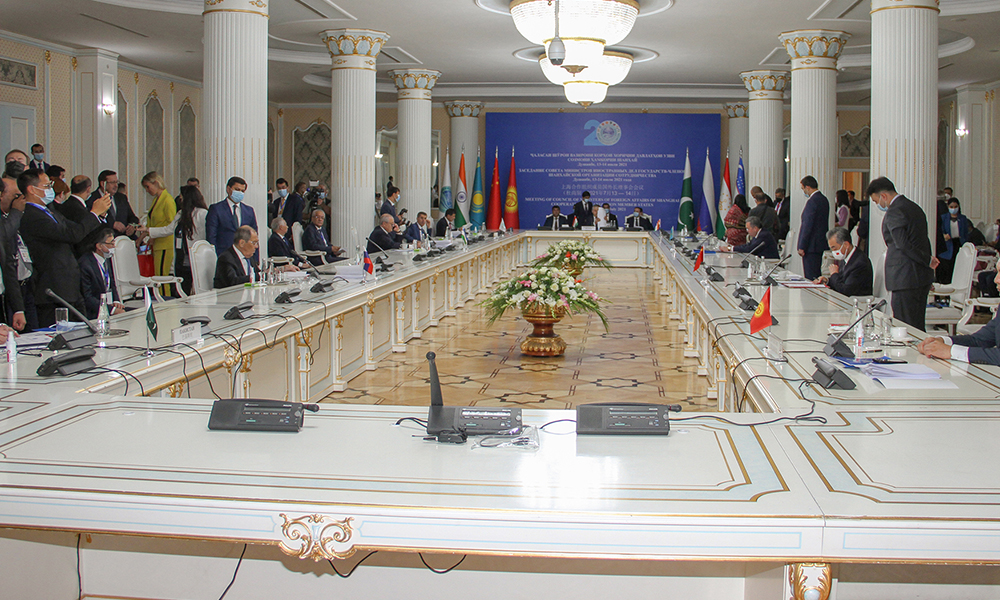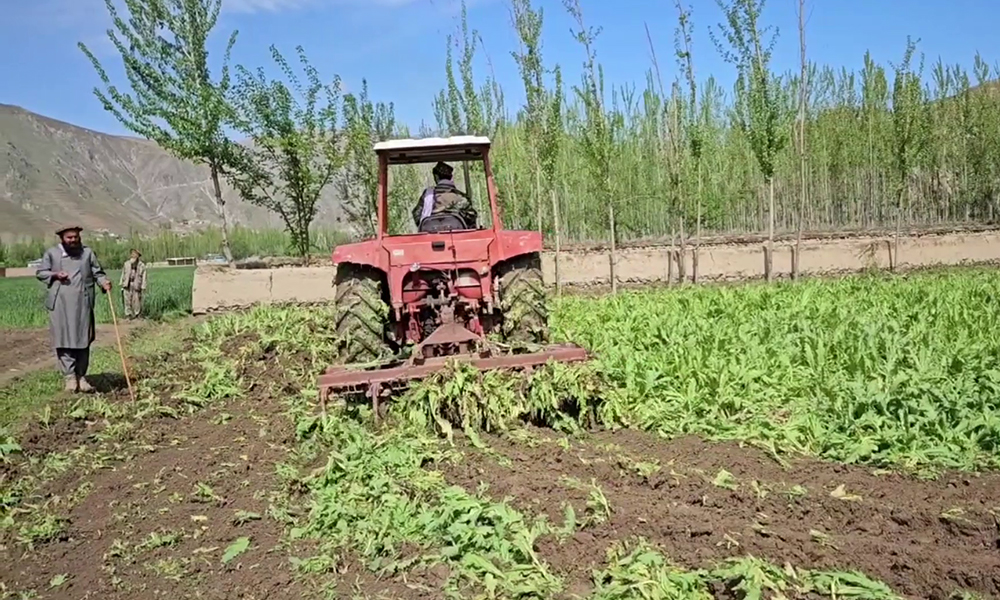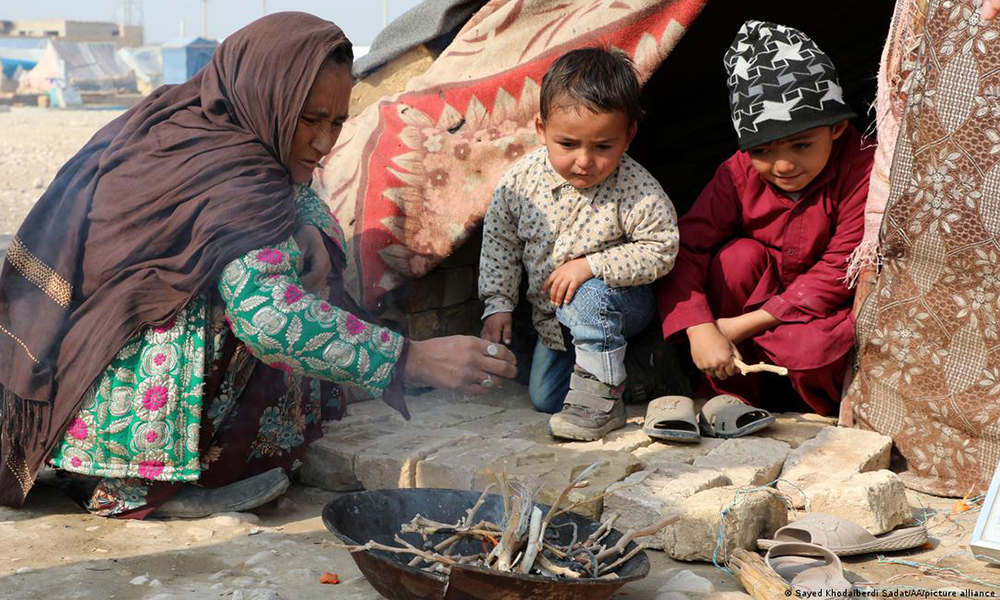Latest News
SCO foreign ministers issue joint statement on Afghanistan

Foreign ministers of the Shanghai Cooperation Organization (SCO) member countries issued a joint statement following a meeting in the format of the SCO-Afghanistan Contact Group on Wednesday.
The foreign ministers stand for the development of Afghanistan as an independent, neutral, united, peaceful, democratic and prosperous state, according to the statement.
They realize that peace and stability in that country is one of the main factors in ensuring security in the SCO region, the statement said, adding that the ministers are convinced of the need to continue helping the Afghan people in their efforts to restore the country and return to the road of peace and national accord.
The foreign ministers declared in the statement the following:
“As friendly neighbors and important partners of Afghanistan, the SCO member states are interested in its development as a peaceful, stable and prosperous country, and confirm their respect for the traditions and culture of all peoples living in Afghanistan.
In accordance with universally accepted principles and norms of international law, primarily the UN Charter, the SCO countries reaffirm their respect for the sovereignty, independence and territorial integrity of Afghanistan. They intend to facilitate the development of Afghanistan as a country free from terrorism, war and drugs.
“We condemn the violence and terror attacks that continue in Afghanistan, killing civilians and representatives of government bodies and call for their cessation as soon as possible. We note that the activities of international terrorist organizations remain one of the key factors of instability in that country. We express our deep concern over the escalation of tensions in the northern provinces of Afghanistan as a result of a sharp increase in the concentration of various terrorist, separatist and extremist groups. We consider it important for the SCO member states to enhance their joint efforts in order to counteract terrorism, separatism and extremism.
“We urge all parties involved in the conflict in Afghanistan to refrain from the use of force and actions that may lead to destabilization and unpredictable consequences near the Afghan borders with the SCO states.”
The SCO member states reaffirm their willingness to continue developing cooperation with Afghanistan on countering security threats in the region, in particular, all forms and manifestations of terrorism and drug trafficking, and to jointly oppose double standards in resolving these tasks.
Emphasizing the importance of long-term hospitality and effective aid for Afghan refugees, the SCO members consider it important for the international community to take active joint efforts to facilitate their proper, safe and sustainable return home.
“We believe that reaching an early settlement in Afghanistan is a major factor in maintaining and strengthening security and stability in the SCO space. In this context, we emphasize the need for the government and people of the Islamic Republic of Afghanistan to intensify their efforts to restore peace, promote national economic development and counter terrorism, extremism and drug-related crime. We confirm the position of the SCO members that the conflict in Afghanistan can only be settled by political dialogue and an inclusive peace process conducted and led by the Afghans themselves.
“We urge all interested states and international organizations to strengthen their cooperation, with the UN playing a central coordinating role, in order to stabilize and develop the country. In this context, we note the activities of the UN Assistance Mission in Afghanistan, the Special Envoy of the UN Secretary-General and the UN Regional Centre for Preventive Diplomacy.
“We welcome the diplomatic support for the peace process in Afghanistan by the international public, including the inter-Afghan peace talks in Doha, the extended Troika, the Moscow consultations format and the Tashkent venue. We note the outcome of the ministerial meeting of the Heart of Asia – Istanbul process in Dushanbe on March 29-30, 2021.
Respecting the Afghan people’s independent choice of their own path of development, we are convinced that the inter-Afghan negotiations must consider the interests of all ethnic groups living in the country.
“We attach much importance to our cooperation in the SCO-Afghanistan Contact Group. We consider it necessary to consistently implement the roadmap for further action by the Contact Group, which was adopted in Bishkek on June 14, 2019, with a view to strengthening regional stability and developing relations between the SCO states and Afghanistan.
“We reaffirm the willingness of our countries to continue deepening cooperation with Afghanistan in politics and security, as well as in the economic and humanitarian spheres, including by maximizing the potential of Afghanistan‘s participation as an observer state in the SCO’s activities.”
Latest News
Over 6,000 acres of land cleared of poppies in Badakhshan

Badakhshan Police Command says it has cleared more than 6,000 acres of poppy fields in northern Badakhshan province.
The anti-narcotics department of Badakhshan Police Command says that since the beginning of the campaign to destroy the poppy fields in this province, they have cleared more than 6,000 acres of land.
According to these officials, poppies have however been planted in more than 10 districts this year.
The anti-narcotics department of the Badakhshan Police Command says that the campaign to destroy the poppy plantations started two months ago and continues.
According to the officials, during this period, 6,300 acres of land has been cleared.
Some of the farmers whose fields were destroyed say that poppy is more profitable than other agricultural products, but now that their land has been cleared, they want alternative crops.
According to the officials, Kishim, Argo, Darayimand and Jurm districts are among the districts where poppies are cultivated.
Latest News
MSF ‘deeply concerned’ over new phase of deportations of Afghans from Pakistan

Médecins Sans Frontières (MSF) said Wednesday it was deeply concerned for the rights and welfare of Afghan refugees in Pakistan in the wake of the recent announcement by Islamabad that it plans to start Phase Two of the deportation campaign.
Pakistan is home to an estimated 3.7 million Afghans, and a reported 500,000 have crossed the border so far.
Many Afghans living in Pakistan have been there for decades and have spent more time in the country than their country of origin, without any legal recourse to remain in the only place they can effectively call “home”.
For many Afghans, Islamabad’s “repatriation” campaign means packing up their belongings and carrying them on a horse, cart, car and bus and traveling en masse to a country that is already struggling with widespread poverty, inadequate health services and increased restrictions on women, MSF said in a statement.
The second phase of the deportations leaves an estimated 800,000 Pakistan-issued Afghan Citizen Card (ACC) holders vulnerable to return, while phase three is expected to result in the further deportation of UNHCR-issued Proof of Registration (PoR) card holders, MSF said.
MSF first started working in Pakistan in 1986, and today provides much-needed medical care to people in Balochistan, Khyber Pakhtunkhwa and Sindh provinces.
The Islamic Emirate of Afghanistan (IEA) and UN agencies estimate that more than half a million people have been deported from Pakistan or voluntarily returned to Afghanistan in the past six months.
The United Nations High Commissioner for Refugees said last month that nearly two million Afghan refugees are living in Pakistan and that the agency needs $368 million this year to assist these people.
Latest News
2023 marred by ‘tremendous challenges’ for Afghanistan

Last year, 2023, was a year of “tremendous challenges” for the people of Afghanistan, but it was also a year marked by resilience and determination, the Deputy Special Representative of the Secretary-General, Resident and Humanitarian Coordinator, Indrika Ratwatte, said in the UN’s annual report on Afghanistan that was published this week.
Ratwatte said: “In the face of adversity and multiple concurrent shocks, the people of Afghanistan have demonstrated remarkable courage and strength.”
Afghans now mention access to food as their most pressing need, he said adding that “unable to pay for or produce basic sustenance, millions face hunger and malnutrition.”
In 2024, an estimated 15.8 million people will experience crisis and emergency levels of food insecurity.
The majority of the population is unable to procure basic needs such as healthcare, food, livelihoods, and housing, the report stated.
The UN found that the country also remains vulnerable to climate change.
Following the worst drought in three decades, emerging El Niño conditions now threaten a new cycle of flooding and crop pests. In this context, lifesaving humanitarian aid has been crucial in preventing the collapse of the social fabric. It has also served to underpin the stability of the economy. Despite growing humanitarian needs, relevant funding cuts have forced humanitarian actors to prioritize the most vulnerable further, the report stated.
A Gallup poll found that 95 percent of the population consider themselves to be suffering. In addition to living in poverty, the average life expectancy in Afghanistan has been falling for the past five years.
The Herat earthquakes and unprecedented large-scale returns of refugees from neighbouring countries, including Pakistan and Iran, have shown the disruptive impact of recurrent shocks and underscored the need for sustained international engagement and support, the UN stated.
“As we embark on the next chapter, in 2024, it is imperative that we remain steadfast in our commitment to the principles of human rights, gender equality, and women’s Empowerment,” Ratwatte said.
“We will continue to include women as key partners in our work, to provide assistance ‘by women, for women’, and to tirelessly work for equal access to education in line with the demands we hear from Afghans in all areas of the country,” he said.
However, from an economic point of view, Afghanistan’s economy appears to be stabilizing at a low equilibrium level following a period of significant contraction since 2021.
The UN said in the report that growth barriers include severely restricted operations in the banking sector (including microfinance institutions), trade disruptions, and institutional issues hindering service delivery, including in the private sector.
“The sudden cessation of a significant amount of international aid and grants, which had accounted for 40 percent of the country’s Gross Domestic Product (GDP), along with a freeze on international reserves amounting to about US$9 billion and the imposition of international sanctions, caused a severe balance of payments, banking and payment systems crisis.
“Notably, financial restrictions have removed liquidity from the banking system,” the report stated.
Despite the crisis and a period of devaluation towards the end of the year, the AFN is 20 percent stronger than it was in 2021 due to currency export controls, UN cash shipments of US dollars into Afghanistan, and personalremittances.
Imports continued to surpass exports through 2023 and increased as the economy contracted.
“This appears to be a paradox: the currency appreciated while the trade deficit widened, suggesting that there might be other unidentified sources of financing besides US dollar cash shipments and remittances to support the account deficits,” the report read.
The UN also said that with its partners, it will work to initiate a dialogue with the Islamic Emirate on adjustments to regulatory frameworks and sustained public service delivery with the aim of creating a long-term and sustainable pathway to reduce aid dependency and put Afghanistan back on a path towards development
“In this regard, we reiterate our offer to the DFA for a dialogue and will work jointly with international partners, donors, and Afghans on how such engagement can be structured in a most productive way.”
-

 Sport5 days ago
Sport5 days agoACL draw to be broadcast live on ATN channels
-

 Regional5 days ago
Regional5 days agoIRGC chief warns of harsher response if Israel attacks Iran
-

 Sport4 days ago
Sport4 days agoACL fever grows as fixtures finalized
-

 World4 days ago
World4 days agoUS will not take part in any Israeli retaliatory action against Iran
-

 Latest News4 days ago
Latest News4 days agoOver 50 people dead in traffic accidents over Eid
-

 Latest News4 days ago
Latest News4 days agoUS identifies Kabul airport suicide bomber
-

 Business4 days ago
Business4 days agoAfghanistan-Kazakhstan chamber of commerce opens in Herat
-

 Latest News4 days ago
Latest News4 days agoGood rains enable DABS to increase power production in Kabul
























